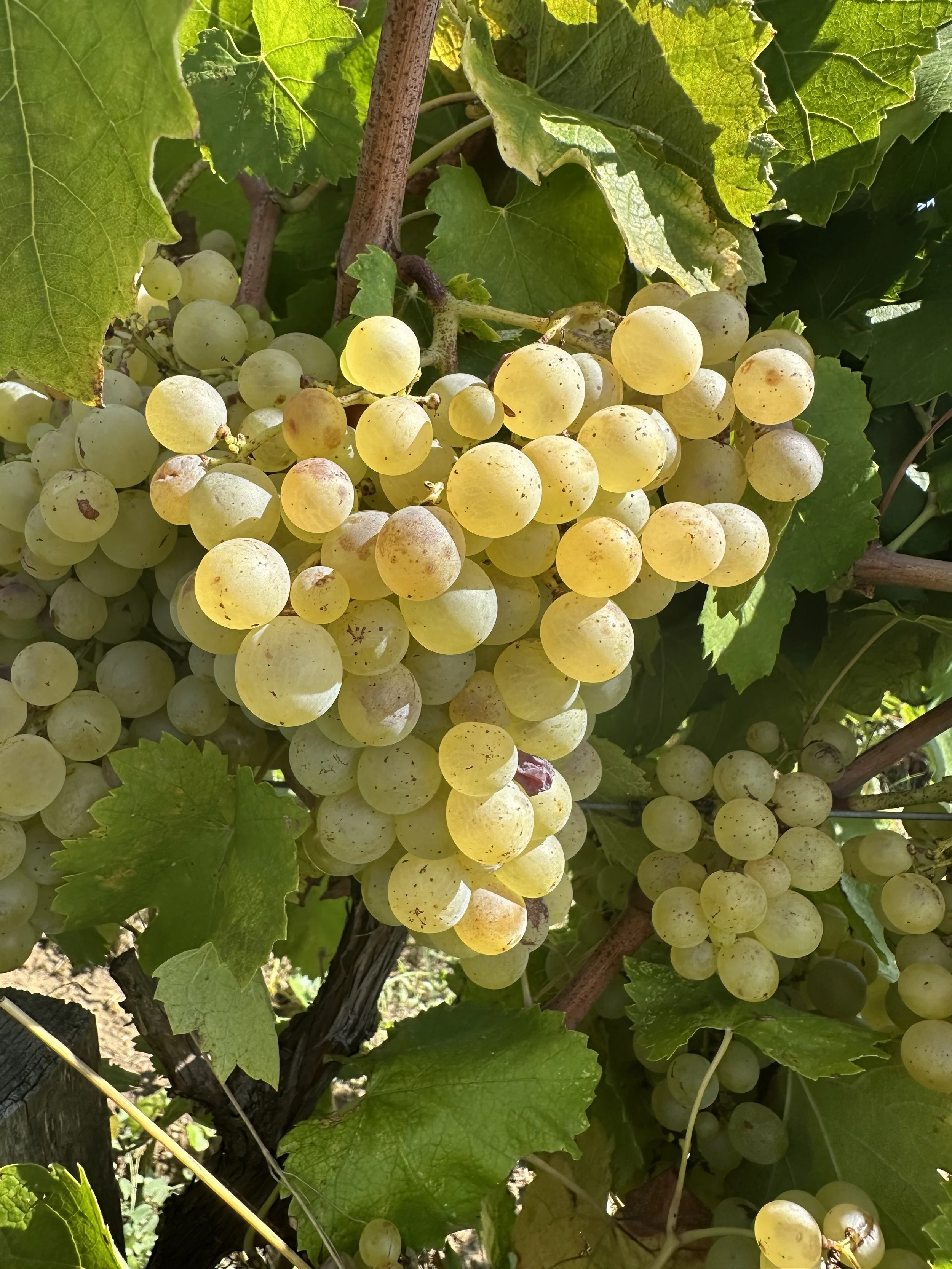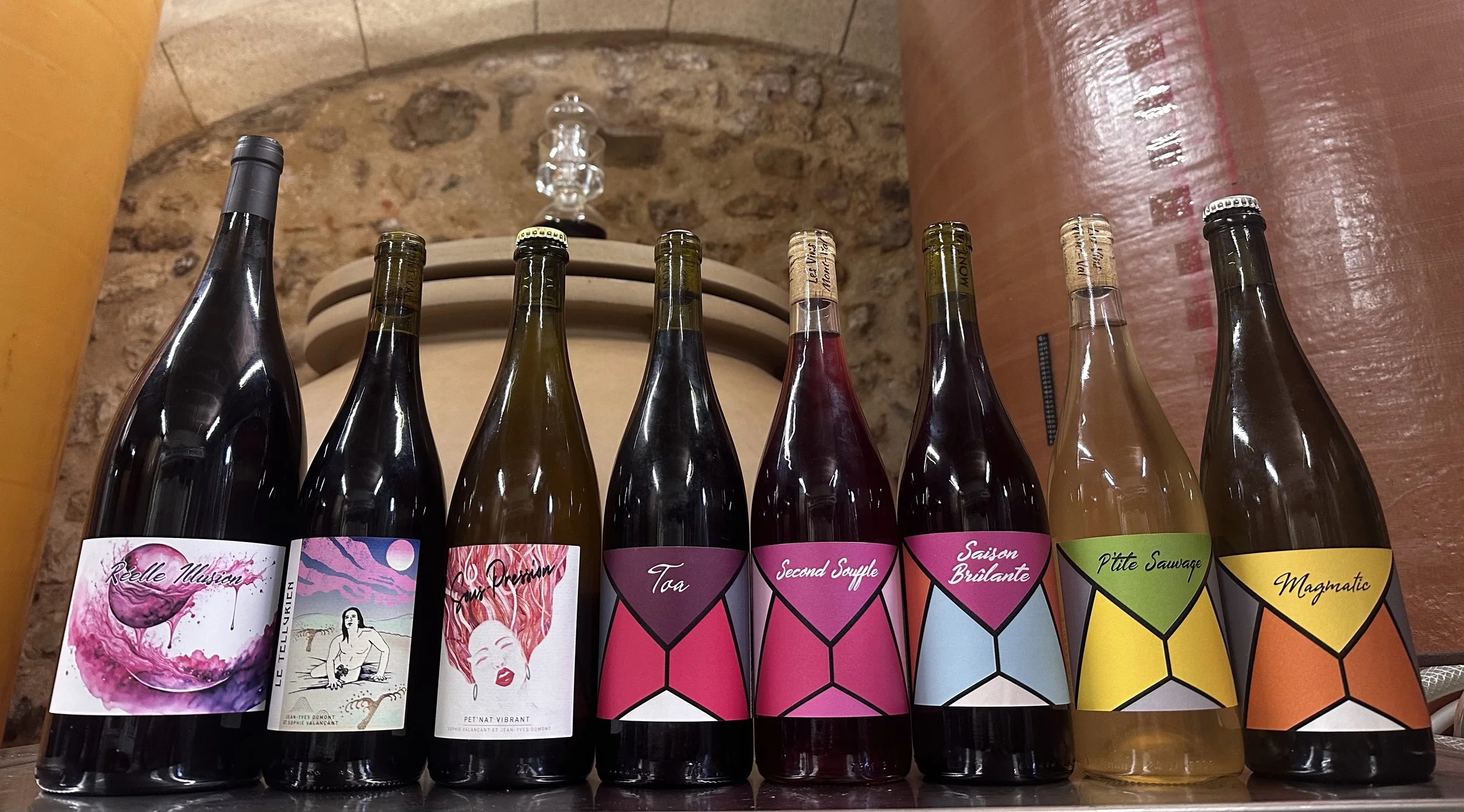In english
Soil management
At our estate, we care for the vines with common sense and kindness. We regularly prepare herbal teas made from nettle, comfrey, and alfalfa, which we apply in the vineyard to strengthen the vines’ vitality. These natural infusions support the plants through their cycles, stimulate their defenses, and help maintain healthy soil balance, a living connection between nature and our work, and a gentle way to accompany the vines throughout the year.
Every gesture in the vineyard is guided by respect for the soil and the life it sustains. We sow cover crops between the rows to protect the earth, reduce erosion, and encourage biodiversity. In winter, our sheep take over, grazing the grass and naturally fertilizing the vines. Beneath the rows, we earth up in winter and remove soil in spring to aerate and stimulate microbial life. We avoid any deep tillage, preferring only light mowing. This thoughtful and balanced approach helps us preserve a vibrant ecosystem, essential to crafting wines of great quality and character.
To further protect our soils, we’ve also chosen to carry out repetitive tasks with a quad rather than a tractor, reducing soil compaction and keeping our vineyards lighter on their feet.
The Estate
6 hectares of hillside vineyards surround the village of Aspiran, growing on clay-limestone soils that draw their uniqueness from the diversity of the land, true treasures for our vines. Each type of soil shapes, in its own way, the character of our wines and gives them a unique identity:
• Clay-limestone soils, a mix of clay (which retains water) and limestone (draining and alkaline). This combination provides a good water reserve thanks to the clay, useful in hot, dry climates, while the limestone ensures effective drainage, preventing excess moisture and encouraging the vines to dig deep for nutrients.
• Villafranchian soils, ancient alluvial deposits (rolled pebbles, sand, and gravel) dating back to the Villafranchian era. These soils offer excellent drainage, pushing the vine roots to grow deep into the ground.
• Clay-basaltic soils, a mix of clay and volcanic basalt rocks or ash. These soils are rich in minerals (iron, magnesium, trace elements), providing a good balance between vigor and growth control. The clay stores water, while the basalt brings great mineral richness.
Together, these terroirs form the soul of Les Vins Mont-Val, where each cuvée stands out for its aromatic finesse and remarkable drinkability.
The Winemakers
For fourteen years, we traveled across France and around the world, pruning shears in hand and a dream in mind: to create our own wines. Wherever we settled (suitcases barely unpacked and boots already on), we crafted our own cuvées. Sometimes small-scale, often humble, but always made with passion… and a few sleepless nights.
Our choices were guided more by dreams than by logic, which we’ve always considered relative anyway. In 2009, after a year of traveling, we proudly announced that we would make our wine in New Zealand.
Promise kept: in 2012, we left France, took our little Manon with us, and set off for Oceania. Between 2015 and 2018, we launched a small négociant business there, entirely free of additives.
At the end of 2018, that chapter came to a close, carried by a new dream: to find vineyards, a cellar, and a place to finally put down roots in France with the same determination as ever, but without a winemaking legacy or great financial means.
That’s how we arrived in Aspiran, in the Hérault region. We were immediately captivated by its generous climate, rich soils, diverse grape varieties, and breathtaking landscapes.
We started by renting our first vineyard, then a second one, before finally buying more. Today, we cultivate 6 hectares of vines and 2 hectares of orchards, mainly citrus trees.
Winemaking
Harvesting is done only in the cool hours, from 6:30 a.m. to noon, or earlier if temperatures rise too high.
Each bunch is carefully hand-picked and placed in 14 kg ventilated crates to preserve the integrity of the grapes.
A rigorous sorting is carried out directly in the vineyard when necessary. We pay close attention to the health of the grapes and make sure they are vinified as quickly as possible after picking, to preserve their freshness and aromatic potential.
Depending on the cuvée and vintage, we vinify whole clusters or after destemming. Nothing is automated: we adjust our methods each year as part of a continuous improvement approach to produce wines that are precise and balanced.
Cold plays a crucial role in our work. It enhances the expression of fruit and ensures smooth fermentations, resulting in wines that are pure, fresh, and harmonious.
The pressing stage is key. Pressings are long and gradual, sometimes extended overnight, to extract the purest juice without forcing the matter. This gentle approach allows us to obtain clear, precise, and elegant musts that faithfully express the character of the vintage and the terroir.
Finally, our wines are vinified without any additives. No yeast, enzymes, or other agents are added: we trust the grapes and the work done in the vineyard.
For some cuvées, we may use a micro-dose of sulfur, only if necessary to ensure wine stability. But this is never systematic or automatic, each cuvée evolves at its own pace according to its needs.


